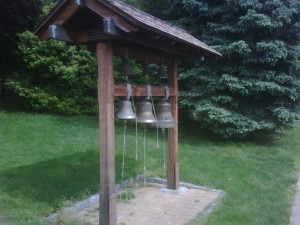
“When we see the world as an end in itself, everything becomes itself a value and consequently loses all value, because only in God is found the meaning (value) of everything, and the world is meaningful only when it is the ‘sacrament’ of God’s presence.”
– Alexander Schmemann, For the Life of the World
I’m headed out early tomorrow morning to New York City for a second time in a month. The main purpose for my trip is to interview recent graduates from St. Vladimir’s Orthodox Theological Seminary for the Learning Pastoral Imagination Project. In preparation for understanding the context of the stories we will receive, I’ve been reading various books and websites.
Among the most helpful is Alexander Schmemann’s For the Life of the World. He wrote the book, according to a preface to the 1973 edition, for students in 1963 to interpret for them the meaning of the Eucharist and the purpose or mission of the church. Schmemann served as a faculty member and later dean of St. Vladimir’s from 1951 until his death in 1983. In his time, as in ours, the rampant divisions of sacred and secular, supernatural and natural, contemplation and action, church and world, were assumed and unquestioned everywhere, including the churches.
Schmemann makes the stunningly simple and profound observation that God is in all and all is in God. He does not try to prove his point or explain it so much as “confirm” that the divisions are false and that the life we live in Christ is a sacramental one through and through. He says (my paraphrase) about our basic human needs as a connecting point to sacred presence: We are hungry beings. But we are hungry for God. Behind all the hunger of our life is God. All desire is finally desire for God. To be sure, we are not the only hungry beings. All that exists lives by ‘eating.’ The whole creation depends on food. But the unique position of humans in the universe is that we alone are to bless God for the food and life we receive from God.*
He is not suggesting that we try to balance sacred and secular, but that there is no division. He is noticing the way the best of the Orthodox tradition holds together two ways of seeing the world that seem totally incompatible to our western binary minds: the “goodness of the world” and “the wickedness in which the world lies.” In Christ these ways of seeing come together and are held so that all who have ears to hear and eyes to see can enter in to this same mystery. In Christ, Schmemann says, “is the end of religion.” Yet he makes no denial that many other ways of incarnation are available, and the presence of God is in all, waiting for our notice, our participation, our very being.

For me this way of thinking and living – it is both, not one or the other – hits a chord that I’ve been trying to play for some time. It gets at a way I’ve been trying to imagine grace and its presence in all things, even when I can’t immediately see anything worth seeing. Some theologians try to get at this by noticing what is happening in politics or popular culture as a starting point. I’ve tended to begin in everyday life and human relationships and common human experiences of love, grief, alienation, desire, suffering and generativity as places for noticing the presence of God in all.
I’m just getting a good start on For the Life of the World, and not every note rings true, but I’m intrigued enough to keep reading and keep playing the tune to hear what harmony emerges.
________________________
* The changes I’ve made to Shmemann’s words are only to make them inclusive. He himself argues for the inadequacy and brokenness of religion, and by implication language. Instead of using the generic “man,” which is no longer generic, as it was at mid-twentieth century, I have used instead the closer more powerful “we” to make his points.



